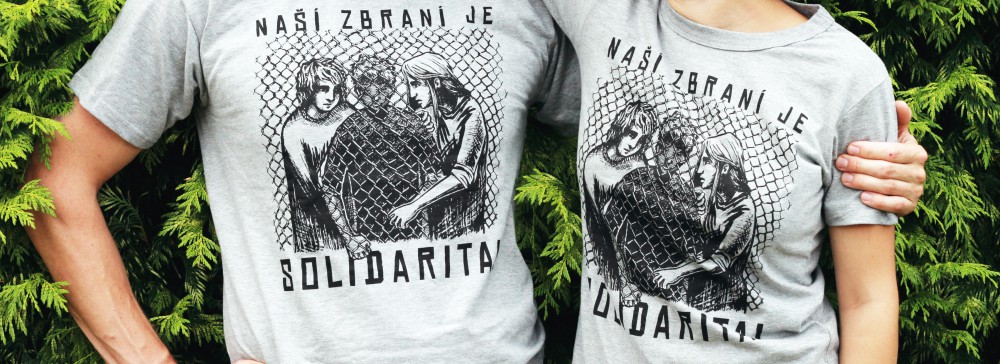An open letter called “The impetus for the General Inspection of Security Forces and the Municipal Public Prosecutor’s Office in Prague” was published 2 days ago on many Czech media servers and it’s signed by many “public figures” (the term media used to label the signatories). We have no expectations of “democratic state” nor police but we hope that this appeal will put the situation under the spotlight and open new angles of perspective. Such ones, which will lead towards new discussion about the topic:
The impetus for the General Inspection of Security Forces and the Municipal Public Prosecutor’s Office in Prague.
During the highly publicized police operation Fénix eleven people were arrested and vast number of police forces and equipment were deployment. Three of them are now being prosecuted with very serious allegations of terrorist conspiracy. Police publicly announced the existence of extensive “terrorist” network but information available from other sources have raised many suspicions not just about the true purpose of the operation Fenix but also about the methods of police deployment in general.
By all accounts, it seems that the police in this case (as it has done many times in the past) linked multiple unrelated cases. The alleged attack on a freight train that would probably justify such serious allegations, was according to the police in stage of planning and was never realized.
The alleged group was very small (few people at most) and at the time of planning the attack (autumn of 2014) group was infiltrated, according to police sources by two undercover operatives. We can imagine that testimonies of those infiltrators will most likely be used as main body of evidence against the imprisoned individuals. Such situation confronts us with the question whether the alleged crimes were not provoked by police infiltrators them self because in a small group, actions of two individuals could have determinative effect.
We are asking what protection is available to citizens of the Czech Republic against these forms of police work and if such forms of police operations are even admissible in democratic state. From the available information so far, we feel concerned over police operations in which the perpetrators can not be distinguished from investigators. Bombastic police events where no one can be sure whether they are results of provocation or if the police is actively trying to provoke crime.
Therefore, we demand an independent investigation of the role of police provocation in this case, by the General Inspection of Security Forces and the supervising prosecutor’s office. Without such an investigation, we can hardly trust the results of the investigation in such a serious case and such methods give rise to serious suspicions about methods and functioning of police in democratic state.
Hynek Alt (výtvarný umělec)
Vasil Artamonov (výtvarný umělec)
Zbyněk Baladrán (výtvarný umělec)
Pavel Barša (politolog)
Ivan Bartoš (informatik, bývalý předseda České pirátské strany)
Anežka Bartlová (teoretička umění)
Milena Bartlová (teoretička a historička umění)
Petr A. Bílek (literární vědec)
Vjera Borozan (historička umění)
Adam Borzič (básník, šéfredaktor Tvaru)
Ondřej Buddeus (překladatel a spisovatel)
Ondřej Císař (sociolog)
Aleš Čermák (výtvarný umělec)
Jiří David (výtvarný umělec)
František Dryje (básník, šéfredaktor revue Analogon)
Palo Fabuš (redaktor časopisu Umělec)
LP Fish (šéfredaktor časopisu Živel)
Michal Hauser (filozof)
Agáta Hauserová (pěvkyně)
Vít Havránek (kurátor a teoretik umění)
Martin Hekrdla (novinář)
Hana Holcnerová (publicistka, signatářka Charty 77)
Markéta Hrbková (básnířka, signatářka Charty 77)
Petra Hůlová (spisovatelka)
Michaela Ivaniškinová (historička umění)
Vít Janeček (dokumentarista)
Markéta Jonášová (teoretička umění)
Václav Kahuda (spisovatel)
Kateřina Kalistová (náměstkyně ministra kultury)
Barbora Kleinhamplová (výtvarná umělkyně)
Vít Klusák (dokumentarista)
Alexey Klyuykov (výtvarný umělec)
Karel Kouba (šéfredaktor A2)
Petr Kupka (doktorand bezpečnostních studií)
Kateřina Lišková (socioložka)
Ivan Mečl (nakladatel a galerista)
Matěj Metelec (publicista)
Arnošt Novák (sociální ekolog)
Jiří Pallas (analytik, signatář Charty 77)
Petr Pithart (bývalý předseda Senátu, signatář Charty 77)
Miroslav Petříček (filozof)
Marcus Pape (lidskoprávní aktivista)
Jakub Patočka (šéfredaktor Deníku Referendum)
Zuzana Piussi (dokumentaristka)
Jiří Ptáček (kritik a kurátor umění)
Jiří Přibáň (právní vědec)
Tereza Reichová (dokumentaristka)
Anna Remešová (teoretička umění)
Filip Remunda (dokumentarista)
Janek Rous (výtvarný umělec)
Lukáš Rychetský (zástupce šéfredaktora A2)
Apolena Rychlíková (dokumentaristka)
Jakub Řehák (básník)
Petr Řehák (básník a psychoterapeut)
S.d.Ch. (spisovatel a dramatik)
Jan Schneider (bezpečnostní analytik, signatář Charty 77)
Ondřej Slačálek (politolog a novinář)
Tereza Stejskalová (výtvarná kritička)
Pavel Sterec (výtvarník)
Tereza Stöckelová (socioložka)
Matěj Stropnický (náměstek pražské primátorky)
Helena Svatošová (právnička)
Ladislav Šerý (filozof)
Martin Škabraha (filozof)
Josef Šlerka (vysokoškolský pedagog)
Ivan Štampach (religionista)
Milan Štefanec (environmentální a lidskoprávní aktivista)
Václav Trojan (programátor, signatář Charty 77)
Jakub Vaníček (literární kritik)
Kateřina Vaňková (technička)
Michal Uhl (sociolog)
Petr Uhl (novinář, signatář Charty 77)
Karel Vachek (dokumentarista)
